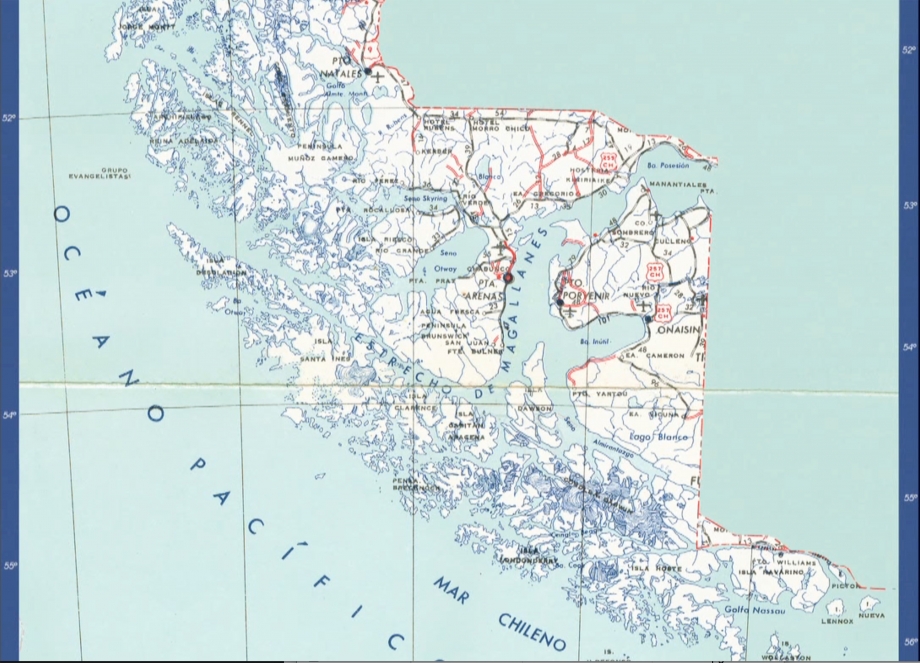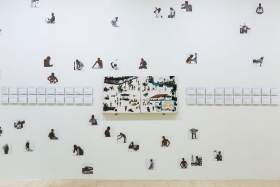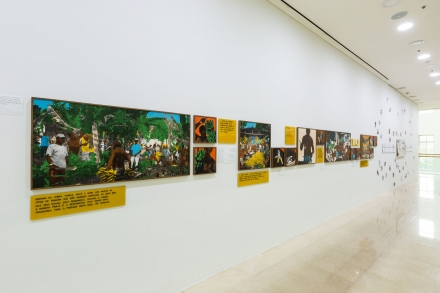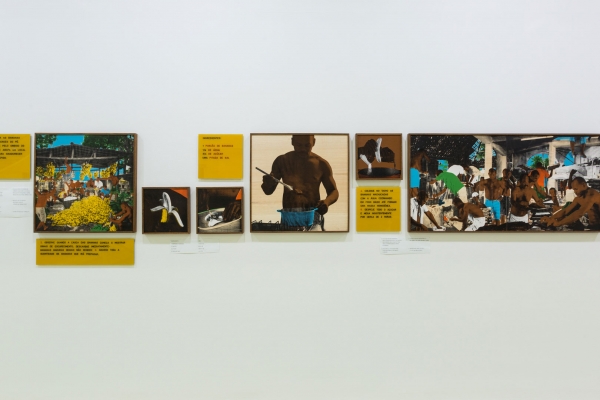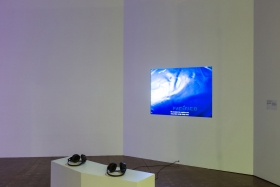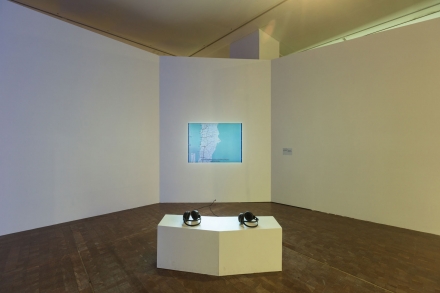Jonathas de Andrade
Pac?fico [Pacific], 2010, Animation with styrofoam model boards, maps and paper stop motion in Super-8, 12 min. 45 sec., Courtesy of the artist and Galeria Vermelho
40 Nego Bom ? 1 Real [40 Black Candies for 1 Real], 2013, Installation composed of 40 risograph prints (each 20 x 20 cm), 80 laser prints (each 15 x 15 cm), 4 pantograph prints on plexiglass (each 17.5 x 65 cm), 3 pantograph prints on plexiglass (each 30 x 30 cm), 10 serigraphies on plywood (each 31 x 31 x 3 cm), 3 serigraphies on plywood (each 66.5 x 66.5 x 3 cm), and 2 serigraphies on plywood (each 66.5 x 132 x 3 cm), Courtesy of the artist and Galeria Vermelho
Pac?fico [Pacific] begins with an animation based on a virtual scenario in which a massive earthquake erupts over the Andes, detaching Chile from the South American continent, leaving Chile a floating island adrift in the seas. When the artist visited Bolivia, he was affected by the way the loss of the sea to Chile in the bloody Pacific War (1879?1884) was a delicate, unresolved subject, a real historical taboo. While Bolivians are providing education on this history that didactically shows the injustice of what was done, in Chile, the existence of the war is not emphasized— rather, they teach that the whole coast has always been Chilean. The animation represents scenes of earthquakes and the cracking ground using miniatures made of paper and styrofoam, the materials used for practical teaching in these regions. The work evokes ideas of the construction of truth, relative trustworthiness, historical resentment as a social feeling, and the fabrication of mass commotion and emotion as political artifice. The animation is followed by serial black and white photographs along with a firm narration of the “yesterday” and “today” of Chile, using words or statements like “yesterday, disorder, violence, insecurity,” and “today, order, peace.” Images of the map of the Pacific Ocean and the Chilean coast, together with the narrated stories of the people who had experienced the earthquake, end with a song. The stark contrast in the tones of the narrations gives rise to the question of where the border between truth and non-truth lies.
In 40 Nego Bom ? 1 Real [40 Black Candies for 1 Real], 142 pieces of text and images, which are laid out across a wall spanning about 15 meters long, can be viewed in two parts. The first part shows the process of making Nego Bom candies, the banana-flavored candy popular in Northeastern Brazil, through pictures and a detailed recipe. The second part consists of a wage calculation chart, which also contains information on the particular characteristics of forty individual workers, including job descriptions, relationship on the job site, and even personal details. However, the workers’ wages are not simply calculated in numbers according to volume of work; rather they are calculated to reflect each worker’s relationship to the employer and other individual particularities. Delving more deeply into issues such as postcolonialism, post slavery, and cheap labour, the artist uncovers the hidden dark side of Brazilian culture, which is the mixed product of colonizers, slaves, and indigenous peoples.
For the title of the work, the artist has chosen “40 Black Candies for 1 Real,” which is a phrase commonly shouted by market vendors selling Nego Bom candy. In Portuguese, Nego Bom literally means “good black,” and “nego” (for male), or “nega” (for female), is a friendly way of calling each other. However, linguistically these words also have historical, colonial, and racist connotations.
Jonathas de Andrade
b. 1982. Lives and works in Recife.?
Past solo exhibitions include Centro Cultural S?o Paulo, 2010; Galeria Vermelho, S?o Paulo, 2013, 2010; Kunsthalle Lisbon, 2013; Mus?e d’art Contemporain de Montr?al, 2013; Museu de Arte do Rio, 2013; and Galeria Alexander and Bonin, New York, 2014. He participated in the Mercosul Biennial, Porto Alegre, 2009; S?o Paulo Biennial, 2010; Istanbul Biennial, 2011; New Museum Triennial: The Ungovernables, New York, 2012; Lyon Biennial, 2013; Dakar Biennial, 2014; and Under the Same Sun: Art from Latin America Today, Guggenheim Museum, New York, 2014.
